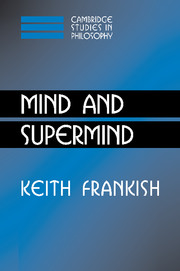Book contents
Conclusion
Published online by Cambridge University Press: 22 September 2009
Summary
I have made some big claims in this book. I have presented a revisionary view of folk psychology and at the same time a revisionary picture of the architecture of the human mind. I think that the resulting picture is coherent, but am not sanguine enough to believe that I have got everything right (though in the present context I do of course acceptp that I have). I am, however, very confident of the fundamental claim that both folk psychology and scientific psychology require a two-strand theory of belief and reasoning, and if I have succeeded in making that claim look credible and given some useful pointers as to how the theory should be developed, then I shall be satisfied.
Finally, I hope that this work will tend to have an irenic effect – showing how some apparently conflicting views about the mind can be reconciled. It is natural to adopt a confrontational style in academic debate: inquiry is about truth, not compromise, and a forensic approach is often the best way to uncover it. It can mislead us, however. Some conflicts are specious, and sometimes we need to step back and take a wider view. I hope that this work has demonstrated the attractions of such an approach in thinking about the mind.
- Type
- Chapter
- Information
- Mind and Supermind , pp. 234Publisher: Cambridge University PressPrint publication year: 2004



